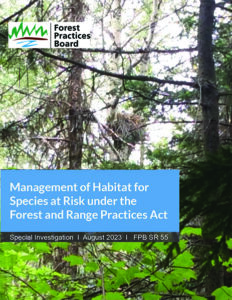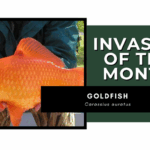Home »

FPB investigation reveals lack of transparency and direction
 The Forest Practices Board (FPB) has released an investigative report about the management of habitat for species-at-risk under the Forest and Range Practices Act and concludes the B.C. government has work to do.
The Forest Practices Board (FPB) has released an investigative report about the management of habitat for species-at-risk under the Forest and Range Practices Act and concludes the B.C. government has work to do.
The report examines the government’s use of tools available under the act to protect habitat for species-at-risk and forest licensees’ compliance with legal requirements.
In this investigation, the board looked at a sample of areas where legal measures are in place for habitat protection and found that operational-level forest planning and practices were consistent with those legal requirements.
“Where government sets clear, legal objectives, licensees comply,” said Bruce Larson, vice-chair, Forest Practices Board. “However, the legal tools available to government aren’t always being used and we found a lack of transparency in how government makes decisions about balancing timber supply and habitat protection.”
Additionally, the board found that the process of listing species to enable the use of the act’s legal tools is slow and cumbersome, and has not kept pace with the current risk status of species in B.C.
“Conditions are continually changing on the land base, especially with increasing climate-related events like wildfires,” Larson said. “A more clear and efficient listing process could help government implement legislative and policy tools quicker, preventing critical habitat loss.”
The board is calling for government to update its policies for managing the habitat of species-at-risk, including increasing transparency and clear direction on the use and timing of available tools under the act, as well as supporting an integrated approach to habitat supply that considers multiple species.
The Forest Practices Board is B.C.’s independent watchdog for sound forest and range practices, reporting its findings and recommendations directly to the public and government. The board audits forest and range practices on public lands and the appropriateness of government enforcement. It can also make recommendations for improvement to practices and legislation.
e-KNOW file photo
e-KNOW







